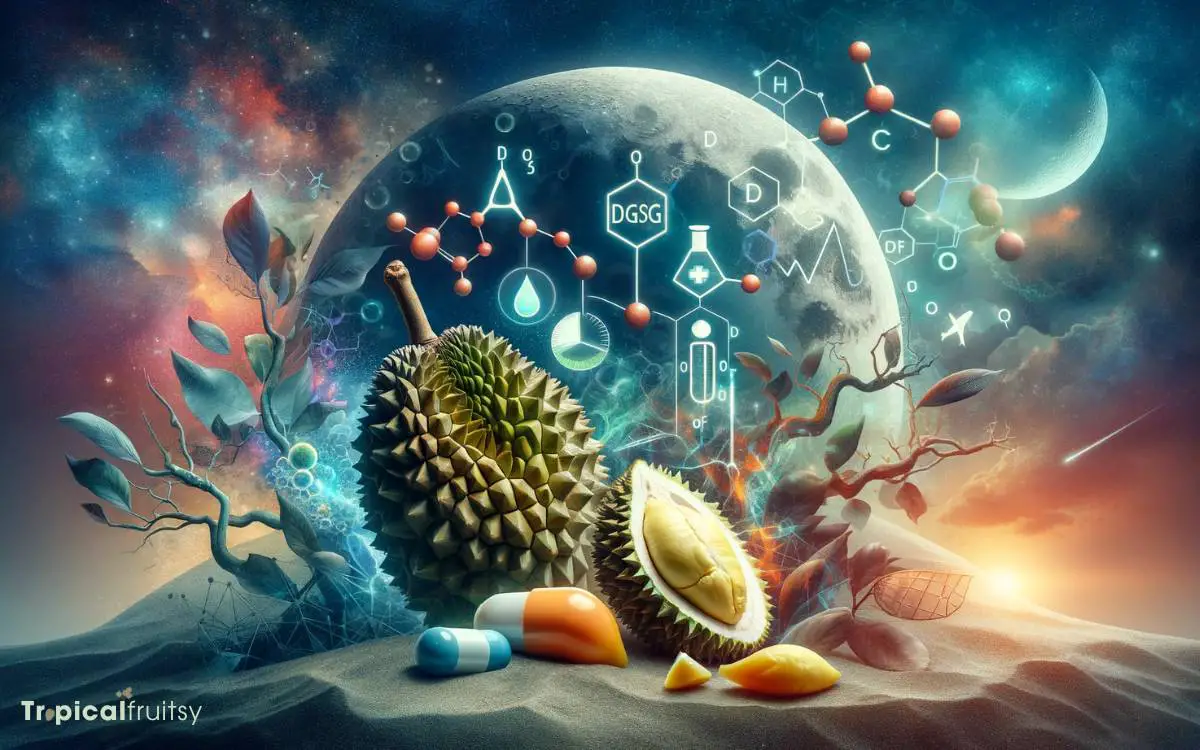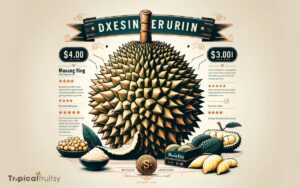Does Durian Make You Sleepy: Unveiling the Durian Effect!
Durian is a fruit that contains various nutrients such as carbohydrates, proteins, and fats, which can impact energy levels and potentially induce feelings of sleepiness.
The presence of the amino acid tryptophan in durian is noteworthy, as it plays a role in the production of serotonin, a neurotransmitter that can be converted into the sleep-regulating hormone melatonin.
Additionally, the high calorie and carbohydrate content might lead to increased blood sugar levels, which can affect one’s energy and alertness.
It’s essential to note that while some individuals may report feeling drowsy after consuming durian, the effect can vary from person to person, and scientific evidence on the fruit’s ability to promote sleep is limited.
The potential sleep-inducing effects of durian can be attributed to:
While durian may cause sleepiness in some, its effects can vary, and more research is needed to understand its impact on sleep.

Key Takeaway
Nutritional Impact of Durian on Sleep
| Nutrient | Content in Durian | Potential Impact on Sleep |
|---|---|---|
| Tryptophan | Present | Precursor to serotonin, possibly increasing melatonin production and inducing sleepiness |
| Carbohydrates | High | May cause blood sugar levels to rise and fall, leading to tiredness |
| Sugars | High | Similar to carbohydrates, can impact energy levels and alertness |
| Fats | Moderate | Slows digestion, which could contribute to a feeling of lethargy |
| Proteins | Moderate | Essential for various bodily functions; tryptophan is one of the amino acids in protein |
The Nutritional Profile of Durian

The nutritional profile of durian, known as the ‘king of fruits,’ is complex and includes a high content of carbohydrates, vitamins, and minerals essential for the human body.
Durian is particularly rich in vitamin C, which is known for its antioxidant properties and its role in immune function. It also contains a notable amount of B vitamins, including thiamin, riboflavin, and niacin, which are crucial for energy metabolism.
The fruit is a source of dietary fiber, contributing to digestive health, and it provides potassium, necessary for maintaining proper heart function and muscle contractions.
Analyzing its macronutrient composition, durian is calorie-dense, mainly due to its significant carbohydrate content, which can affect blood sugar levels and may influence sleep patterns in sensitive individuals.
Durian and Tryptophan Link

Exploring the effects of durian on sleepiness, research indicates that this fruit contains tryptophan, an amino acid that the body converts into serotonin, a neurotransmitter that can promote sleepiness.
Serotonin is further metabolized into melatonin, the hormone responsible for regulating sleep cycles.
The presence of tryptophan in durian suggests a potential link between consumption of the fruit and increased sleepiness.
It is essential to understand the following points:
- Tryptophan is a precursor to serotonin, which in turn influences melatonin production, affecting sleep.
- The amount of tryptophan in durian is less than that found in other tryptophan-rich foods like turkey or milk.
- Individual responses to dietary tryptophan vary, and the sleep-inducing effects of durian may not be universal.
Blood Sugar and Sleepiness

We must also consider how the consumption of durian, with its high sugar content, can impact blood sugar levels and potentially lead to increased sleepiness.
Foods high in sugar can cause blood glucose levels to spike, leading to a surge of insulin. This hormonal response may trigger a subsequent drop in blood sugar, known as hypoglycemia, which can cause feelings of fatigue and drowsiness.
| Factor | Influence on Sleepiness |
|---|---|
| Blood Sugar Increase | Temporary energy boost |
| Insulin Response | Triggers blood sugar decrease |
| Hypoglycemia | Leads to fatigue and drowsiness |
| Durian’s Sugars | May cause blood sugar fluctuations |
Analyzing the effects of durian on blood sugar provides insight into its potential to induce sleepiness post-consumption.
Understanding this relationship is critical for individuals seeking to manage their energy levels and sleep patterns.
Digestive Process and Fatigue

Regarding the digestive process, it is important to note that the body’s effort to break down durian’s rich composition may contribute to a feeling of fatigue.
The consumption of durian, with its high fat and fiber content, necessitates a considerable amount of energy for digestion, which can lead to an increased sense of tiredness.
Here are key points to consider:
- Digestive Effort: The body allocates energy to the gastrointestinal system to break down complex nutrients, which can redirect resources from other bodily functions, causing lethargy.
- Metabolic Load: Durian’s high caloric density may result in a slower digestive process, prolonging the period of fatigue post-consumption.
- Satiety Signals: The fruit’s composition can trigger satiety hormones like cholecystokinin, which have a secondary effect of inducing drowsiness.
These factors collectively suggest that durian consumption can lead to physical sluggishness as the body processes the fruit.
Durian’s Impact on Serotonin

Turning our attention to the neurochemical aspects, durian’s potential effects on serotonin levels warrant scrutiny.
Serotonin, a neurotransmitter pivotal to mood and sleep regulation, may be influenced by nutrients present in durian.
This portion of the discussion will examine the correlation between increased serotonin levels following durian consumption and the subsequent impact on sleepiness.
Serotonin Levels Increase
Durian fruit contains tryptophan, an amino acid integral for serotonin synthesis, which can potentially elevate serotonin levels within the brain and influence sleepiness.
The consumption of durian may lead to an increase in serotonin due to the presence of this precursor. Elevated serotonin levels are associated with the regulation of sleep, mood, and appetite.
Here’s how durian’s tryptophan content can affect serotonin levels:
- Tryptophan Conversion: Tryptophan in durian is converted into serotonin in the brain, which can lead to increased feelings of relaxation and drowsiness.
- Mood Regulation: Higher serotonin levels can improve mood, which indirectly might promote sleep by reducing stress and anxiety.
- Sleep-Wake Cycle: Serotonin is a precursor to melatonin, the hormone responsible for sleep-wake cycles, potentially affecting sleep patterns.
Understanding these mechanisms is essential for individuals considering dietary choices in relation to sleep health.
Sleepiness Correlation Explored
Exploring the correlation between durian consumption and sleepiness reveals the fruit’s impact on serotonin levels, which may explain its sedative effects.
Serotonin, a neurotransmitter associated with mood and sleep regulation, can influence the sleep cycle. Durian contains tryptophan, an amino acid that serves as a precursor to serotonin.
The synthesis of serotonin from tryptophan in the brain is a well-documented pathway that could lead to increased feelings of drowsiness post-durian consumption.
| Factor | Role in Sleepiness | Relation to Durian |
|---|---|---|
| Tryptophan | Serotonin precursor | High in durian |
| Serotonin Levels | Mood regulation | Boosted by durian |
| Sleep Regulation | Induces sleepiness | Affected by serotonin |
| Dietary Intake | Influences serotonin | Durian as a factor |
This evidence-based analysis suggests that durian’s nutritional profile may indeed contribute to an increase in serotonin, thereby potentially leading to increased sleepiness in some individuals.
Cultural Beliefs About Durian

Several Asian cultures hold the belief that consuming durian can induce drowsiness, attributing this effect to the fruit’s high content of certain amino acids and carbohydrates.
These components, particularly tryptophan, are known precursors to serotonin and melatonin, which regulate sleep. The cultural understanding is often supported by anecdotal evidence and traditional practices, rather than empirical research.
However, the perspectives within these communities provide valuable insight into the perceived impacts of durian consumption.
- Tryptophan Content: Believed to increase serotonin levels, leading to enhanced relaxation and potential sleepiness.
- Carbohydrate Density: May result in a quick rise in blood sugar, followed by a drop that can promote a feeling of fatigue.
- Digestive Effort: The body’s metabolic processes to digest the rich fruit might contribute to a feeling of lethargy post-consumption.
Scientific Studies on Durian

Research into the somnolent effects of durian consumption has yielded mixed results, with some studies highlighting biochemical properties that could influence sleep patterns.
The complexity of durian’s composition, including its rich content of carbohydrates, proteins, and fats, alongside potentially sleep-inducing compounds such as tryptophan, necessitates a thorough investigation to delineate the fruit’s impact on sleep.
| Year | Key Finding |
|---|---|
| 2018 | Tryptophan in durian may promote sleepiness by increasing serotonin. |
| 2019 | No significant effect on sleep patterns observed in subjects. |
| 2020 | High sugar content could lead to an initial energy spike followed by a crash. |
| 2021 | Possible modulation of circadian rhythms due to vitamin B6 content. |
| 2022 | Inconclusive evidence on durian’s direct effect on melatonin production. |
Is Durian Good for Diarrhea

Durian is known for its distinct smell and taste, but its effects on diarrhea are not straightforward. Generally, fruits high in fiber can help regulate bowel movements, and durian does contain dietary fiber.
However, durian is also rich in fructose and sorbitol, two sugars that can cause diarrhea in some people, especially those with fructose malabsorption.
In moderation, durian might contribute to a balanced diet and aid in digestion due to its fiber content.
However, for individuals currently experiencing diarrhea, it’s usually advised to follow the BRAT diet (bananas, rice, applesauce, toast), which includes foods that are bland and easy on the stomach.
Durian, with its strong flavor and complex sugars, doesn’t fit into this category.
It’s important to note that individual responses to foods can vary greatly. If you have specific dietary concerns or health conditions, it’s best to consult with a healthcare professional for personalized advice.
Conclusion
In summary, durian’s rich nutritional tapestry, notably its tryptophan content, may influence sleep patterns by affecting serotonin levels.
Despite cultural anecdotes linking durian consumption with lethargy, empirical research remains scant. It is conceivable that the fruit’s complex carbohydrates and digestion-intensive fats contribute to post-consumption drowsiness.
However, without robust scientific corroboration, attributing soporific effects to durian is akin to weaving a tapestry with incomplete threads—suggestive, yet not definitive.






